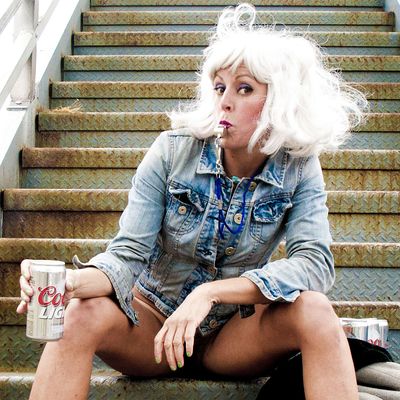
“So, anyone here been raped?” asks Adrienne Truscott, with the cheery enthusiasm of a camp counselor. She’s onstage at Joe’s Pub, swigging from a bottle of Stella, wearing only a blonde wig, pink bra, jean jacket, and heels. Her pubic hair is right at the audience’s eye level. After a few nervous chuckles from the crowd, Truscott continues. “Anyone here raped anyone?” She peers around at the silent room. “At least statistically, there’s probably a rapist in here.”
We’re here for Adrienne Truscott’s Asking For It: A One-Lady Rape About Comedy Starring Her Pussy and Little Else, the rape-comedy show that Truscott has been performing for the past three years. Truscott performs the show in in character — a ditzier, goofier version of herself, with a slight Southern lilt, a comic creation in the spirit of Amy Sedaris or Anna Faris — and, as mentioned, very few clothes. Her outfit (or lack thereof) is partly to get bums in seats, partly to be funny, and partly to make a point about the way we police women’s bodies.
“It’s the most ‘asking for it’ outfit I could think of,” she tells me on the phone the next day. “You can add or take alcohol out of the equation, you can add or take a miniskirt out of the equation, but if you take a rapist out of the equation, nobody gets raped.”
The show is billed as standup, but it also features elements of Truscott’s career as a performance artist, dancer, and burlesque performer, where she made a name for herself as half of duo the Wau Wau Sisters. That includes “pussy puppetry” (projecting videos of men talking onto her vagina, sometimes while she’s doing a handstand), dance breaks, music, audience participation, prop comedy, and broad physical gags (a banana peel is involved, as is a rape whistle), all of which provide moments of levity amidst her scathing observations about rape and rape culture. For what’s ostensibly a comedy show, there’s an awful lot of uncomfortable silences, but Truscott always knew there would be. It’s hard to make jokes about sexual assault. That’s the point; it should be hard.
Truscott started developing the show with the notion that standup might be an interesting way to talk about some of the questions that had long been swirling around in her brain. “I thought they were such unlikely bedfellows that if you could make it work it would be really powerful,” said Truscott, who had never done standup before. Then, in July 2012, comedian Daniel Tosh set off a civil war within the comedy community after riffing that a heckler at his show ought to be gang raped — and Truscott’s project gained a new sense of urgency.
When the show premiered at the Edinburgh Fringe Festival the following year, Truscott had no idea it would be a hit. “I thought if I even pull it off, it’ll maybe be interesting people for like six months to a year,” she says now. “I’ll just tour the fuck out of it and move on.”
And yet rape has remained as relevant a subject as ever. After the Cosby news broke back in 2014, Truscott retooled the show to cover the allegations, and this week, she devoted a good portion of the show to the Brock Turner case (“I don’t look like a rapist, do I? White, college educated, pretty good swimmer?”). Now, in addition to performing across the world, Truscott has been bringing the show to college campuses, using it as an educational tool to discuss both sexual assault on campus and issues of political correctness and free speech.
Truscott has found herself at the nexus of a growing conversation about where humor and progressivism intersect, who can speak for whom, and what is and isn’t okay to joke about (as she riffs onstage: “Fucking feminism is totally ruining sexism!”). And the show has evolved into being both a commentary on rape culture itself and a criticism of the lazy way that comedians talk about sexual assault. As she performs, the stage is covered with framed photographs of comedians like Tosh, Jim Jeffries, Doug Stanhope, Damon Wayans, and Seth MacFarlane, all of whom have told rape jokes in their act (the exception, of course, being Bill Cosby, because “he would never”).
Still, while Truscott may not laugh at your bad rape jokes, she will defend to the death your right to bomb onstage making them. “A bunch of white guys making rape jokes to a bunch of other white guys is really not edgy,” she explains. “That was really my issue with the whole rape joke thing.” But a joke that highlights the absurdity of rape culture is very different than one that belittles the experience of victims.
“As someone who likes to punch up in comedy, of course feminism would be a great place to launch jokes from,” she says. “You’re like a fool in the king’s court making jokes about the king.” Truscott is part of a new vanguard of female comics reclaiming the rape joke as a feminist tool, whether it’s Amy Schumer putting out sketches about rape on high school football teams or rape in the military on Inside Amy Schumer, or “Rape is Real and Everywhere,” a Canadian standup show hosted by sexual assault victims Emma Cooper and Heather Jordan Ross, which invites survivors to come and share their rape stories onstage.
“While I’ve made other shows, this one has remained actually more resonant and relevant frankly than I’d hoped,” she says. “Not that I hope my show would change anything, but …” Her voice trails off. “It does always update, and it does still feel relevant.”




